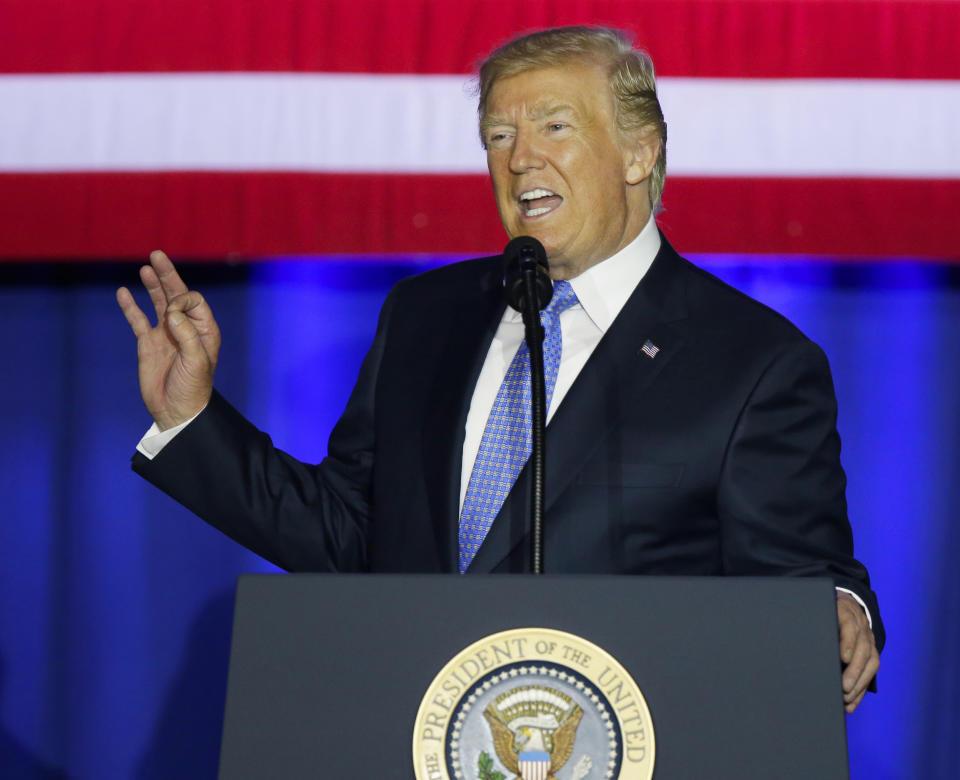GOP lawmakers split on Trump's vow that tax plan won't benefit the rich
WASHINGTON — At a speech in Indiana on Wednesday, President Trump claimed that his sweeping tax reform plan would benefit America’s middle class — not “wealthy and well-connected” people like him.
“They can call me all they want. It’s not going to help,” the former real estate developer said of fellow rich people. “I’m doing the right thing. And it’s not good for me — believe me.”
“It’s not a tax cut for the rich,” Treasury Secretary Steven Mnuchin reiterated Thursday on Fox Business.
But the White House-endorsed plan that Republicans in Congress put out Wednesday appears to benefit rich Americans — though its details are still evolving. And many top Republicans believe cutting taxes for wealthy people would stimulate the economy.
“I want everybody to benefit,” Sen. Richard Shelby, R-Ala., told Yahoo News. “If you’re going to have real tax reform, you gotta have something for everybody.”
Shelby added that he’s not sure about Trump’s pledge that he wouldn’t personally benefit from the plan. “Is he going to benefit? I don’t know,” Shelby said. “It doesn’t matter to me, because I don’t think he’s going to go hungry.”

Sen. Orrin Hatch, R-Utah, told Fox Business on Wednesday that he prefers to lower taxes for wealthy people in order to stimulate spending in the economy. On Thursday, Hatch, the chair of the committee that will be crafting the legislation, said he’d like everyone to get tax relief under the plan, but that wealthy people won’t be the primary beneficiaries.
“I don’t have any problem with everyone getting a break, but I think [Trump’s] right that the rich are not going to reap the whirlwind here,” Hatch said.
The GOP’s tax plan eliminates the estate tax — which benefits people who are inheriting wealth from multimillionaires — and dramatically lowers taxes on business income. The plan also cuts the top income tax rate from 39 percent to 35 percent, while raising the lowest income tax rate from 10 percent to 12 percent. It also repeals the alternative minimum tax, which requires wealthier individuals and corporations to pay more in taxes (it cost Trump more than $30 million in 2005).
The plan’s champions say that by doubling the standard deduction and closing unspecified loopholes used by wealthy people, the legislation would end up benefiting both middle- and low-income people more than the wealthy. The plan also allows for the creation of a fourth, higher tax rate to make sure the tax code “does not shift the tax burden” from rich people to low-income people, but it did not say what that rate would be or who it would apply to.
But Sen. David Perdue, R-Ga., an ally of Trump’s in the Senate, said he believes that lowering the top rate and hiking up the bottom income tax rate creates an “optics” problem for Republicans.
“In my opinion, we ought to keep the top rate where it is, keep the bottom rate where it is and then simplify in-between,” Perdue said. “Or if the president wants to put a surcharge or something like that, that’s another recommendation that would be considered.”
Perdue continued, “In the Republican caucus, there is no champion for increasing benefits for the upper-income classes.”

Sen. Tim Scott, R-S.C., said he believes there will be some kind of mechanism to capture income from the superwealthy in the final plan.
“I think there’s already in the plan itself a surcharge that’s being considered for those folks who make beyond a certain threshold of income,” Scott said. “There’s going to be at least a surcharge.”
House Speaker Paul Ryan, R-Wis., said Thursday that the House and Senate committees hashing out tax reform will figure out exactly how this surcharge will work and who it will apply to.
“The rate reduction won’t be as significant for the high-income earners because we want the relief to go to the middle class,” Ryan said.
During Thursday’s White House briefing, Trump’s economic adviser, Gary Cohn, dodged repeated questions about Trump’s claim that he won’t personally benefit from the tax plan despite the initial framework appearing to boost his finances.
“I think American taxpayers care about what they take home,” Cohn said. The former Goldman Sachs executive said he believed most but not all middle-class Americans would see a tax cut under the legislation.
Trump’s repeated refrain that his tax plan won’t benefit him or people like him could be a strategy to attract Senate Democrats to the plan. He took Sen. Joe Donnelly, D-Ind., with him on Air Force One Wednesday to the rally and urged him to vote for tax reform. Democrats have said they will not support a plan that cuts taxes for the wealthiest Americans.
Trump’s rhetoric also sets up the possibility that he could bad-mouth the final product that emerges out of Congress if he sees it as boosting the rich, such as when he referred to the House’s Obamacare repeal bill as “mean.”
“This cannot be another situation like Obamacare where we get something across the finish line in one chamber and then the president says it’s mean,” said Republican strategist Alex Conant. “If he wants to raise taxes on the wealthy, he should do that. And that’s what the plan should be and he should convince Republicans to support it and get some Democrats on board and lead on it.”
Read more from Yahoo News:
Hurricane Maria coverage revives old questions about Puerto Rico’s status
Activists cling to hope Myanmar leader will step up and fight ethnic cleansing
Locals take on China’s invasion of Africa’s biggest economy: ‘They’re like Goliath, we’re David’
Photos: Hugh Hefner’s death recalls one very special Playboy cover



